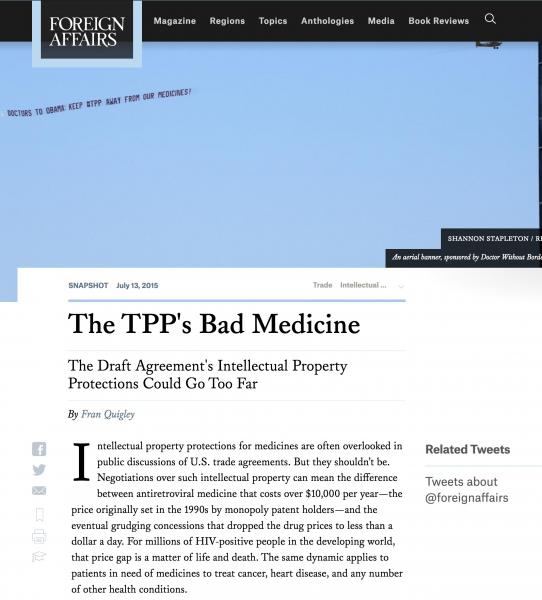
This article was originally published in Foreign Affairs. Read it there, or see an excerpt below:
Intellectual property protections for medicines are often overlooked in public discussions of U.S. trade agreements. But they shouldn’t be. Negotiations over such intellectual property can mean the difference between antiretroviral medicine that costs over $10,000 per year—the price originally set in the 1990s by monopoly patent holders—and the eventual grudging concessions that dropped the drug prices to less than a dollar a day. For millions of HIV-positive people in the developing world, that price gap is a matter of life and death. The same dynamic applies to patients in need of medicines to treat cancer, heart disease, and any number of other health conditions.
Here’s what usually happens: the U.S. trade representative, acting in concert with pharmaceutical companies, proposes extensive patent protections for medicines and daunting barriers that delay generic alternatives from entering markets. Patient-focused civil society organizations, especially those connected to low- and middle-income countries, vigorously object. In the end, though, the prospective U.S. trading partners, looking ahead to increased access to coveted U.S. markets, usually agree to terms that elevate intellectual property rights and restrict affordable access to medicines.
At first glance, the Trans-Pacific Partnership looks to be traveling down this same path. If the agreement is finalized as expected at a late July meeting in Hawaii, the TPP would be largest regional trade agreement in history. The TPP’s 12 member nations, the economies of which make up nearly 40 percent of global GDP, have conducted their talks in secret, with no terms officially announced. But leaked draft texts show that the United States is again pushing provisions that would permit new patents for minor revisions of old medicines, a process known as “evergreening,” and create delays in getting generic alternatives to market by restricting access to clinical test data for patented medicines, a process known as “data exclusivity.”
Other U.S.-drafted TPP terms include patent linkage, which can allow spurious patent filings to delay generic market entry...
